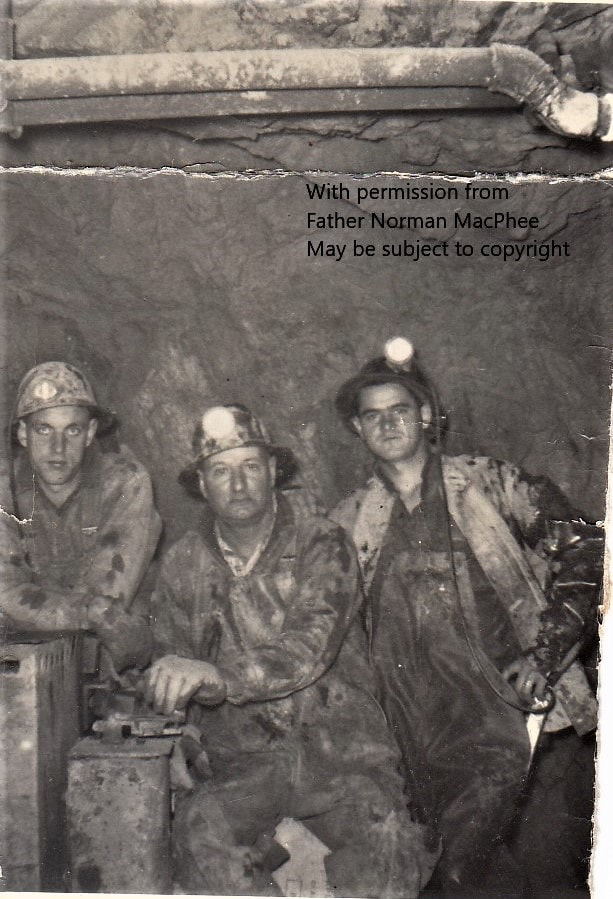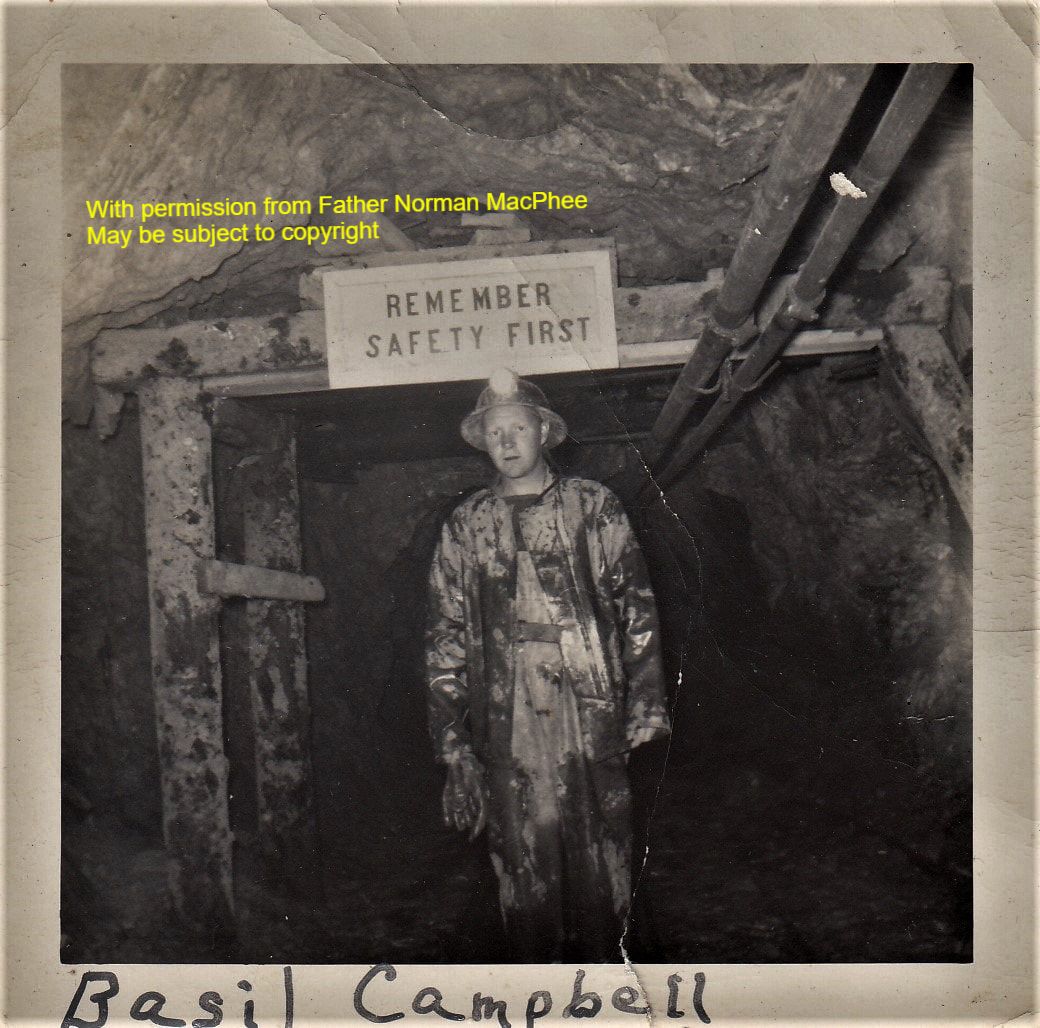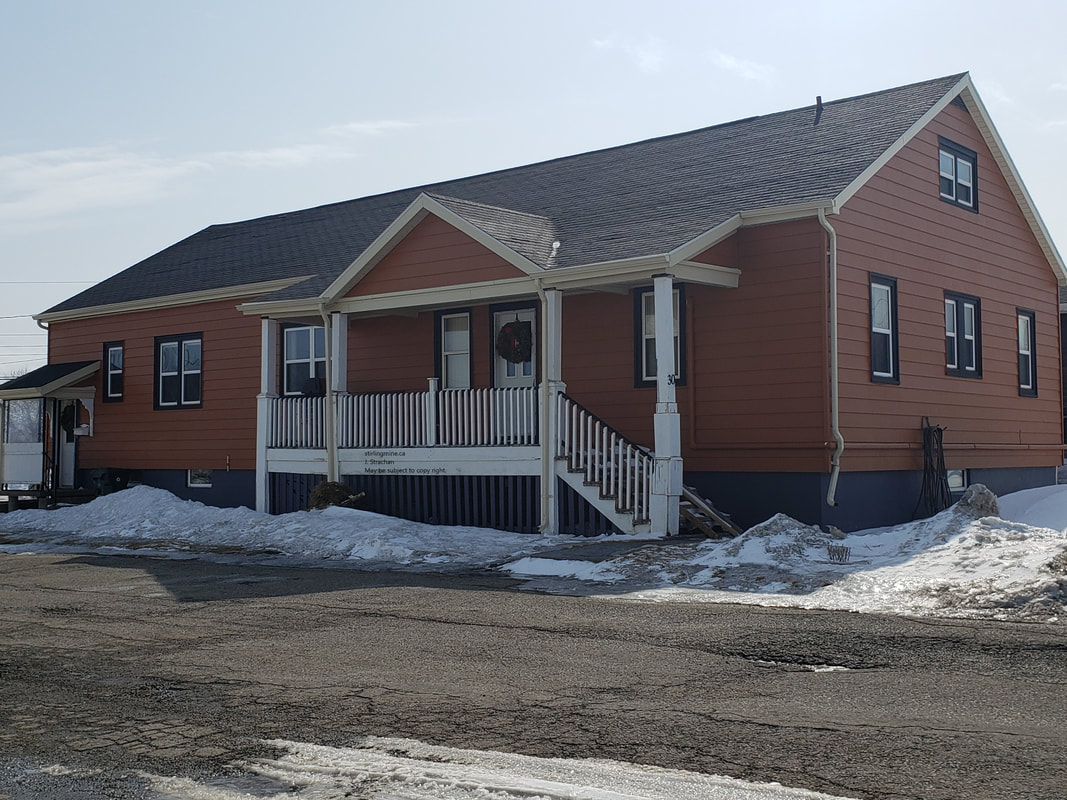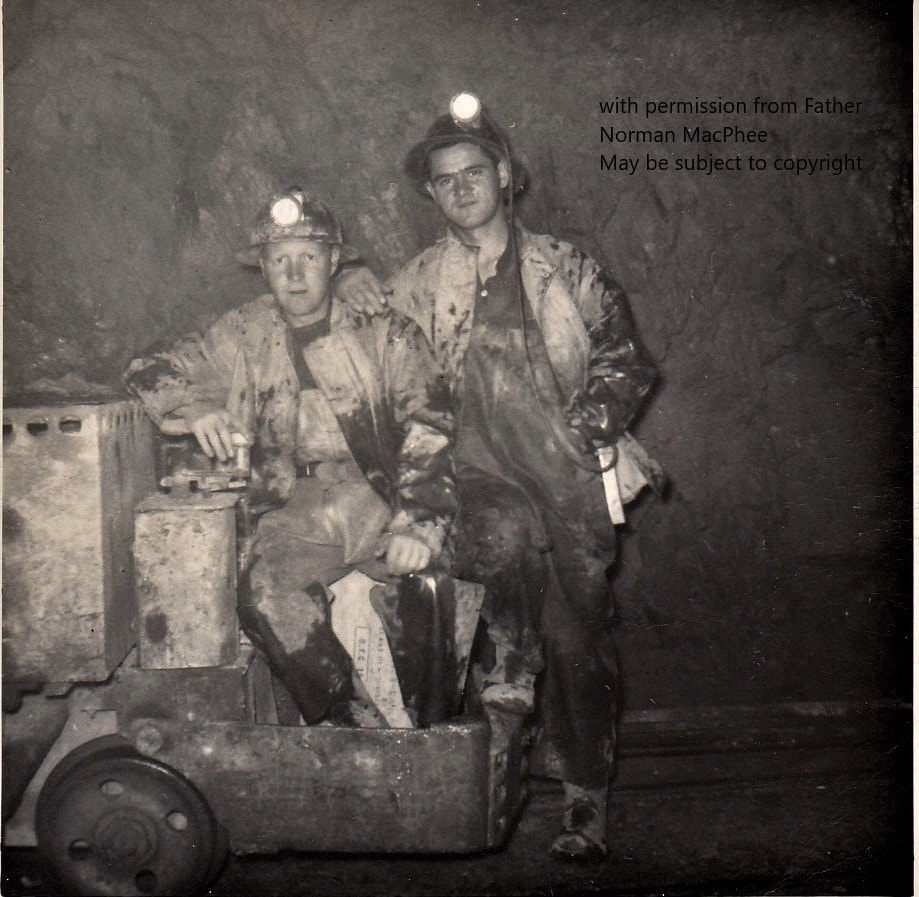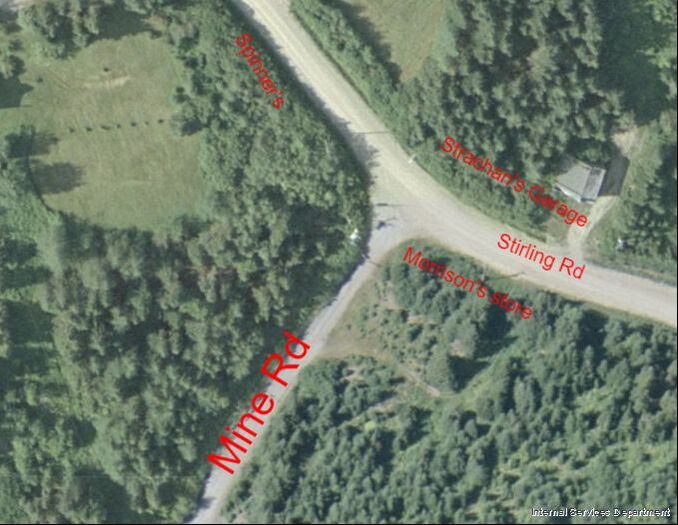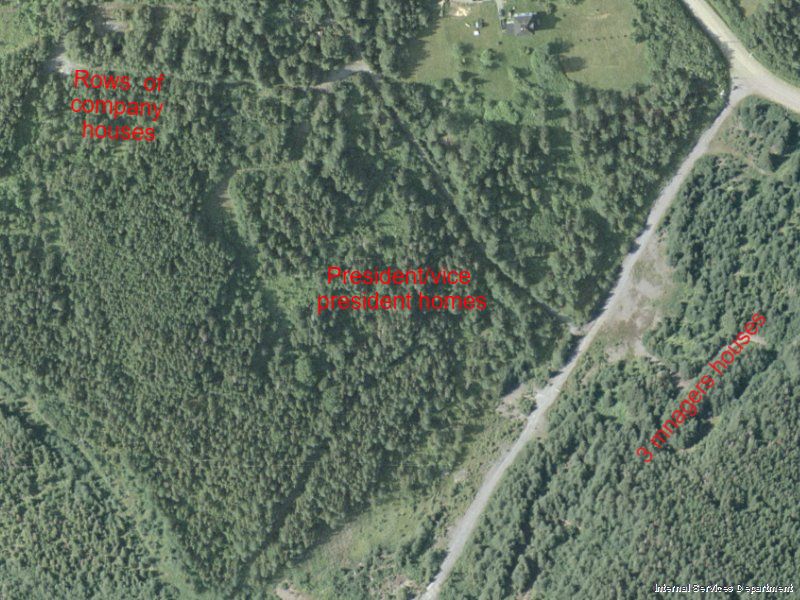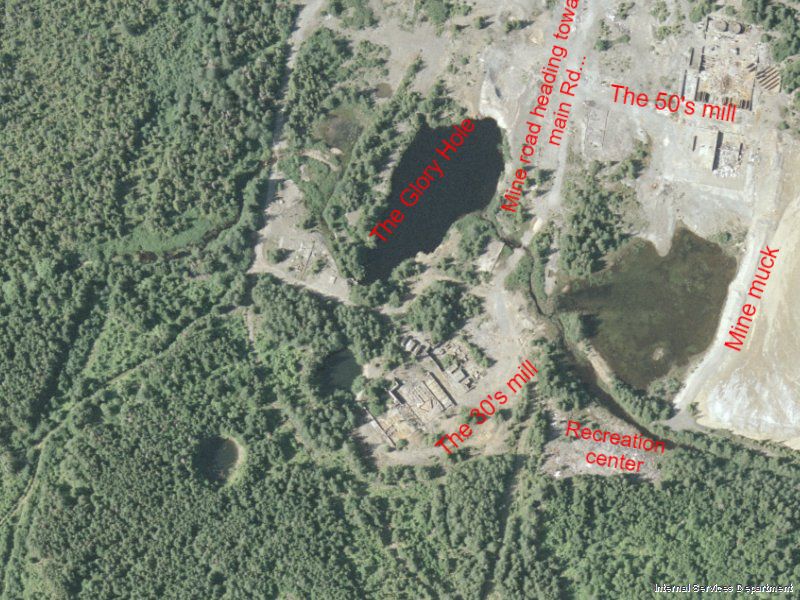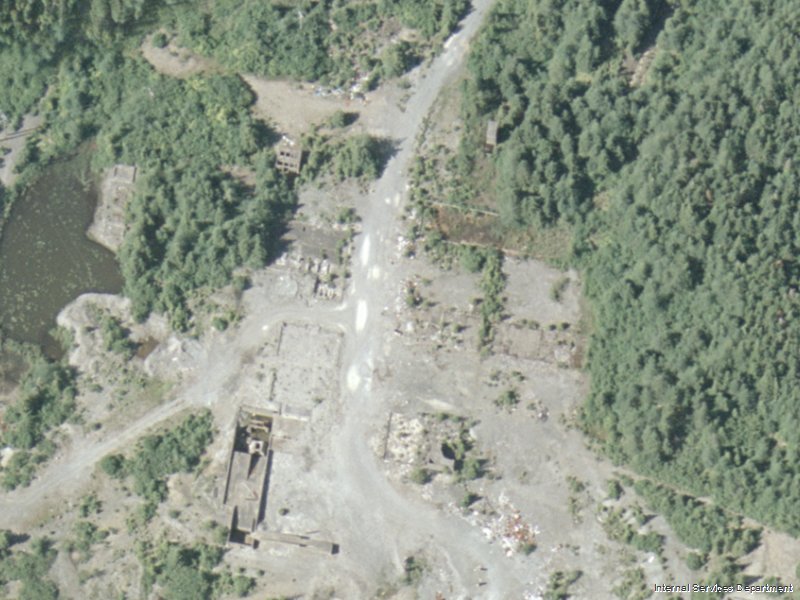Interview with Father Norman MacPhee -Formerly of French Rd, Currently residing in Glace Bay.
Jeanette: When did you start working at the mine?
Father Norman: I started working there in the summers. I worked there two summers, probably the summer of 51 or 52.
Jeanette: That was when it was kind of getting going, right?
Father Norman: No, it was quite in full swing then.
Jeanette: At it’s peak, maybe.
Father Norman: Pretty well at it’s peak, then.
Jeanette: They were still building the new bunkhouses around that time (1951).
Father Norman: More or less, yeah, at that time.
Jeanette: When you were working there in the summer, where did you stay?
father Norman: I stayed one year with my sister Mary whom you know, from Grand Mira North (while she was in Stirling) and the other year I stayed in the bunkhouse.
Jeanette: In one of the new ones?
Father Norman: Oh, it was pretty primitive.
Jeanette: So, it was (likely) one of the old ones; one of the Ram Pastures. Did you ever hear them called that?
Father Norman: No, I haven't heard that terminology.
Jeanette: One of the guys, Wendell Holmes, I don't know if you know him, he was a young man going there too. He worked in the Mill. He was from Grand River and that's where he stayed when he first went there. He called them Ram Pastures.
Father Norman: I never heard that name – Ram pasture.
Jeanette: Ram Pasture - those old bunkhouses. There was one (old bunk house/Ram Pasture) across from the big bunkhouses and when you were leaving going up the road there were two there (on the right). One ended up being turned into a theater -a movie theater. Had you ever gone to a movie there?
Father Norman: Yes, I think we went to movies there.
Jeanette: And across from one of those was the Chinese restaurant.
Father Norman: Yes, I remember that.
Jeanette: My understanding is that it was an old school that was either taken up from Fourchu or Gabarus. In some of the pictures I have, you can just see the roof of it. The family who ran it were Chinese people.
Father Norman: I remember him. I remember going there for meals.
Jeanette: Did you enjoy them?
Father Norman: Yes, I did.
Jeanette: He made good Chinese food. I suppose he made other things.
Father Norman: He cooked other things, but we used to go there to get a Chinese meal.
Jeanette: And did you ever eat at the Dining hall?
Father Norman: Yes, pretty well all the time.
Father Norman: One of the cooks at the dining Hall was Angus Muise.
Jeanette: Yes, I heard of Angus Muise.
Father Norman: He was from Mira Rd, I think, originally, and he went out to be a cook at the Stirling Mine.
Jeanette: Did you have to pay for that?
Father Norman: Yes. It was very cheap. We were paid I think $10 a shift. I think it was $1.25 an hour and we used to get lots of extra shifts -the students - because we were energetic and young. We were there to make some money for University.
Jeanette: Yes
Father Norman: Anyway, if they asked, “would you go out for a 2nd shift?”, We’d say “Yes, we will, of course” laughter. We students would say, “yes, oh yeah, we’ll take any shifts you will give us.” It didn’t matter how many hours because when you are sixteen or seventeen, your energy is boundless. You think nothing of these things. You’d just change the battery on your lamp, and you’d be off again.
Jeanette: And how long would that battery last?
Father Norman: I think it would last a couple of shifts but every time you came in, when you finished a shift, you would recharge.
Jeanette: When you worked another shift, what would you get paid?
Father Norman: Another $10. (Note: Other interviewees have also indicated that there was no overtime paid but they could work as many extra shifts as they wanted.)
Jeanette: That was good pay.
Father Norman: That was good pay back in 1951. If you were making $50 a week you were quite well paid.
Jeanette: Yes.
Father Norman: And University didn't cost much. it only cost $366 for a year, everything included.
Jeanette: Meals and books, included I guess.
Norman: Yes
Jeanette: So, you could make your University money pretty fast.
Father Norman: Yes, very quickly.
Jeanette: Especially if you were doing two shifts a day.
Father Norman: No, I wouldn't do them everyday.
Jeanette: But in a run of a week you would probably get a few extra shifts in?
Father Norman: Exactly, and if they asked us we would go.
Jeanette: You were saying that you were about sixteen or seventeen. Were you not supposed to be eighteen when you went underground?
Father Norman: I don't know, they didn't ask any questions. laughter
Jeanette: I guess not, they were desperate for people.
Father Norman: That's right. we were desperate for work, too. There was little work around the area and so we were glad to work in the mine. I didn't mind it at all. It was wet down there all the time, but you had a rain suit on.
Jeanette: Jacket and oil pants?
Father Norman: Yes, Jacket and oil pants and the men were all very cooperative and caring for each other and looking after each other. That was the safety net - that men look after each other, especially for younger guys, like us.
Jeanette: So, what would they be looking out for, a rock fall or something?
Father Norman: Watching out for things on the track and watching for the ceiling to see if it was moving.
Jeanette: I see. They would give you a heads up to clear out or whatever.
Father Norman: That's right.
Jeanette: There were some accidents at the mine, despite this. There were a few men killed underground, do you remember hearing any stories about that?
Father Norman: I don't remember that.
Jeanette: There were two, I think, underground and there was one up in the mill, three anyway.
Jeanette: So, what were you doing down there? Were you working on the Motors?
Father Norman: We were working on the Motors but also clearing of the tracks because sometimes there would be a spill and we would have to clean off the tracks. We did that and the odd time you may go to the face with the experienced miner and help him putting in the powder, the dynamite.
Jeanette: OK, right.
Father Norman: And you’d be there when he was - see they would try not to have a guy alone.
Jeanette: So, you'd be his back up.
Father Norman: That’s right. And he'd be drilling these holes for the dynamite and he may even give you the machine to hold for a while because they would shake. It would shake the body.
Jeanette: Right, so you would be holding it while he was …
Father Norman: Resting a little bit, resting his arms.
Jeanette: It would be basically drilling then?
Father Norman: Yeah
Jeanette: That was pretty interesting.
Jeanette: So, how did you find out about work at the mine; probably through your family who were working there then?
Father Norman: That’s right.
Jeanette: When did you start working at the mine?
Father Norman: I started working there in the summers. I worked there two summers, probably the summer of 51 or 52.
Jeanette: That was when it was kind of getting going, right?
Father Norman: No, it was quite in full swing then.
Jeanette: At it’s peak, maybe.
Father Norman: Pretty well at it’s peak, then.
Jeanette: They were still building the new bunkhouses around that time (1951).
Father Norman: More or less, yeah, at that time.
Jeanette: When you were working there in the summer, where did you stay?
father Norman: I stayed one year with my sister Mary whom you know, from Grand Mira North (while she was in Stirling) and the other year I stayed in the bunkhouse.
Jeanette: In one of the new ones?
Father Norman: Oh, it was pretty primitive.
Jeanette: So, it was (likely) one of the old ones; one of the Ram Pastures. Did you ever hear them called that?
Father Norman: No, I haven't heard that terminology.
Jeanette: One of the guys, Wendell Holmes, I don't know if you know him, he was a young man going there too. He worked in the Mill. He was from Grand River and that's where he stayed when he first went there. He called them Ram Pastures.
Father Norman: I never heard that name – Ram pasture.
Jeanette: Ram Pasture - those old bunkhouses. There was one (old bunk house/Ram Pasture) across from the big bunkhouses and when you were leaving going up the road there were two there (on the right). One ended up being turned into a theater -a movie theater. Had you ever gone to a movie there?
Father Norman: Yes, I think we went to movies there.
Jeanette: And across from one of those was the Chinese restaurant.
Father Norman: Yes, I remember that.
Jeanette: My understanding is that it was an old school that was either taken up from Fourchu or Gabarus. In some of the pictures I have, you can just see the roof of it. The family who ran it were Chinese people.
Father Norman: I remember him. I remember going there for meals.
Jeanette: Did you enjoy them?
Father Norman: Yes, I did.
Jeanette: He made good Chinese food. I suppose he made other things.
Father Norman: He cooked other things, but we used to go there to get a Chinese meal.
Jeanette: And did you ever eat at the Dining hall?
Father Norman: Yes, pretty well all the time.
Father Norman: One of the cooks at the dining Hall was Angus Muise.
Jeanette: Yes, I heard of Angus Muise.
Father Norman: He was from Mira Rd, I think, originally, and he went out to be a cook at the Stirling Mine.
Jeanette: Did you have to pay for that?
Father Norman: Yes. It was very cheap. We were paid I think $10 a shift. I think it was $1.25 an hour and we used to get lots of extra shifts -the students - because we were energetic and young. We were there to make some money for University.
Jeanette: Yes
Father Norman: Anyway, if they asked, “would you go out for a 2nd shift?”, We’d say “Yes, we will, of course” laughter. We students would say, “yes, oh yeah, we’ll take any shifts you will give us.” It didn’t matter how many hours because when you are sixteen or seventeen, your energy is boundless. You think nothing of these things. You’d just change the battery on your lamp, and you’d be off again.
Jeanette: And how long would that battery last?
Father Norman: I think it would last a couple of shifts but every time you came in, when you finished a shift, you would recharge.
Jeanette: When you worked another shift, what would you get paid?
Father Norman: Another $10. (Note: Other interviewees have also indicated that there was no overtime paid but they could work as many extra shifts as they wanted.)
Jeanette: That was good pay.
Father Norman: That was good pay back in 1951. If you were making $50 a week you were quite well paid.
Jeanette: Yes.
Father Norman: And University didn't cost much. it only cost $366 for a year, everything included.
Jeanette: Meals and books, included I guess.
Norman: Yes
Jeanette: So, you could make your University money pretty fast.
Father Norman: Yes, very quickly.
Jeanette: Especially if you were doing two shifts a day.
Father Norman: No, I wouldn't do them everyday.
Jeanette: But in a run of a week you would probably get a few extra shifts in?
Father Norman: Exactly, and if they asked us we would go.
Jeanette: You were saying that you were about sixteen or seventeen. Were you not supposed to be eighteen when you went underground?
Father Norman: I don't know, they didn't ask any questions. laughter
Jeanette: I guess not, they were desperate for people.
Father Norman: That's right. we were desperate for work, too. There was little work around the area and so we were glad to work in the mine. I didn't mind it at all. It was wet down there all the time, but you had a rain suit on.
Jeanette: Jacket and oil pants?
Father Norman: Yes, Jacket and oil pants and the men were all very cooperative and caring for each other and looking after each other. That was the safety net - that men look after each other, especially for younger guys, like us.
Jeanette: So, what would they be looking out for, a rock fall or something?
Father Norman: Watching out for things on the track and watching for the ceiling to see if it was moving.
Jeanette: I see. They would give you a heads up to clear out or whatever.
Father Norman: That's right.
Jeanette: There were some accidents at the mine, despite this. There were a few men killed underground, do you remember hearing any stories about that?
Father Norman: I don't remember that.
Jeanette: There were two, I think, underground and there was one up in the mill, three anyway.
Jeanette: So, what were you doing down there? Were you working on the Motors?
Father Norman: We were working on the Motors but also clearing of the tracks because sometimes there would be a spill and we would have to clean off the tracks. We did that and the odd time you may go to the face with the experienced miner and help him putting in the powder, the dynamite.
Jeanette: OK, right.
Father Norman: And you’d be there when he was - see they would try not to have a guy alone.
Jeanette: So, you'd be his back up.
Father Norman: That’s right. And he'd be drilling these holes for the dynamite and he may even give you the machine to hold for a while because they would shake. It would shake the body.
Jeanette: Right, so you would be holding it while he was …
Father Norman: Resting a little bit, resting his arms.
Jeanette: It would be basically drilling then?
Father Norman: Yeah
Jeanette: That was pretty interesting.
Jeanette: So, how did you find out about work at the mine; probably through your family who were working there then?
Father Norman: That’s right.
Jeanette: the three men in this picture. You are on ….
Father Norman: I'm on the right.
Jeanette: The man in the middle, Do You know what his name was?
Father Norman: No
Father Norman: the other two guys I don't know their names. That was 60 years ago. (Note: the man in the middle has been identified as Henry Pottie of Thibeaubville.)
Jeanette: I'm surprised about how much people remember about the mine.
Father Norman: Well it was a booming town when I was there and there was a lot of activity.
Jeanette: Yes, I believe there was about 500 people at one point in time.
Father Norman: probably so.
Father Norman: I'm on the right.
Jeanette: The man in the middle, Do You know what his name was?
Father Norman: No
Father Norman: the other two guys I don't know their names. That was 60 years ago. (Note: the man in the middle has been identified as Henry Pottie of Thibeaubville.)
Jeanette: I'm surprised about how much people remember about the mine.
Father Norman: Well it was a booming town when I was there and there was a lot of activity.
Jeanette: Yes, I believe there was about 500 people at one point in time.
Father Norman: probably so.
Father Norman: Basil Campbell (photo above)
Jeanette: Basil Campbell. It says his name right on it here. He in the front of the mine there. There’s a sign that says, “Safety First”. So, was safety a big thing at the mine?
Father Norman: No, not too much, no; those days not very much.
Jeanette: No?
Father Norman: It wasn’t a high priority.
Jeanette: I see the beams in the picture. That’s how they were holding up the ceilings. Would these be pit props?
Father Norman: Pit props, yes. They’d be pit props and booms.
Jeanette: Booms – Would that be the top part.
Father Norman: The top part – exactly. The roof would be booms. The Booms would be about fourteen feet long and the pit props there, are quite large. They are probably 7x6.
Jeanette: So, miners would put dynamite on the….
Father Norman: On the Face.
Jeanette: The face, where would that be.
Father Norman: In front of you.
Jeanette: OK, as you are going ahead.
Norman: As you go ahead…
Jeanette: So, you would be going down this drift
Father Norman: yeah
Jeanette: And you would come to the end of it and then that would be the face and then they would put a pattern of dynamite…
Father Norman: Exactly
Jeanette: Then blow it, and a bunch of muck would come down, onto the floor.
Father Norman: Yes. They might have to move it by these cars and then move them to a place where there would be a shoot. There would be one in the whole area.
Jeanette: And that would go down and eventually, be skipped up to the surface?
Father Norman: Yes
Jeanette: Do you remember who operated the cage for you to get up and down?
Father Norman: When I was there it was Bernie Gillis.
Jeanette: Was he in the cage or was he in the hoist building?
Father Norman: He would be in the hoist room.
Jeanette: But wouldn't there be a man going up and down on the cage, operating the cage, and closing the door and stuff like that?
Father Norman: Yes, there was.
Jeanette: Do you remember anybody in particular?
Father Norman: No. I remember Bernie Gillis operating the cage in the operating room where he had his gauges and he knew where you were - what level you are on.
Jeanette: And there would be a signal, beeps and things like that.
Father Norman: Yeah.
Jeanette: What did you think the first day that you went down there? Were you scared?
Father Norman: No, I wasn't scared because when you're young like that you're not scared of anything.
Jeanette: Yes, you're invincible aren't you?
Father Norman: That’s right, exactly. You didn't worry a bit about that. We didn't worry about anything because these older miners were keen on these things and you just depended on them.
Jeanette: Did these men go to other places before they came to Stirling?
Father Norman: Yes, many of them worked in Ontario in the Hard Rock Mines. Now, many of these men had lots of experience.
Jeanette: Do you remember Kenny Angus Morrison?
Father Norman: Yes, I do.
Jeanette: He was in Québec and so was my father. My father fell down a shaft up there. He worked in Stirling at the mine as a Carpenter. Your father (Archie MacPhee Sr) worked there too.
Father Norman: Yes, my father worked there too.
The Dry
Jeanette: When you went up afterwards from the mine there was a tunnel that you crossed the road to “The Dry”. That’s where the lamps were.
Father Norman: That's where the lamps were, yes, and you would change your clothes and you would take off these and put on your regular shoes, clothes.
Jeanette: Would you have lockers there?
Father Norman: I don't think so. I think they were just hangers.
Jeanette: So, when you were there, they must have had the electric lamps; the ones that had the battery, right?
Father Norman: The battery, yes.
Jeanette: Wendell Holmes was telling me that when he first started working there, he didn't work down in the mine, but he saw people down there who had the old carbide lamps. Did you ever hear of them? They had water and carbide mixed and you'd have it in the front of your hat, and it would turn into a gas and then you'd have a flint like a lighter and then it would light up like a torch.
Father Norman: We had lamps that were electric, well, battery operated.
Jeanette: Yeah, the electricity just came in there around that time.
Father Norman: It came along in that area 1948.
The Catholic Church
Jeanette: In the Catholic Church- what we called the Catholic Church, because the we were Presbyterian’s. I have two exerpts from the church over in Johnstown. They have some records online.
"Among the events of Father Dan. E. MacDonald’s pastorate were the erection of a large addition to the Johnstown Academy and the opening of a mission church at Stirling, Richmond County. The Stirling venture was necessitated by the beginning of hard-rock mining there some time before. On August 12, 1951, Fr. MacDonald began to offer Mass at Sterling on Sunday mornings and he kept up this schedule throughout the rest of his pastorate. The Stirling mission reached its greatest population in 1954, and on May 20 of that year Bishop MacDonald sent to Johnstown as assistant Father Bernard R. MacDonald, native of Upper Grand Mira. He was the son of Dougald MacDonald and Sarah Jane Currie, and was ordained on June 3, 1950. He was at Johnstown until December 1, 1955."
In addition to his parochial ministrations Father Morley kept up weekly the Sunday visits to the Stirling mission chapel. The mission had reached its peak by the end of 1954 when its Catholic population numbered 265 souls. A year later there were only 210, and by the end of 1956 these had dwindled to 16. Father Morley offered the last Mass at Stirling in October, 1957. From <http://www.johnstown.ca/>
Father Norman: The Priest from Johnstown came over to Stirling and we had a church. Some of the church was brought to The Stirling in Glace Bay here (after the mine closed).
Jeanette: Oh, is that where it is?
Father Norman: And they built the Glebe house in Glace Bay with the building materials.
Jeanette: Basil Campbell. It says his name right on it here. He in the front of the mine there. There’s a sign that says, “Safety First”. So, was safety a big thing at the mine?
Father Norman: No, not too much, no; those days not very much.
Jeanette: No?
Father Norman: It wasn’t a high priority.
Jeanette: I see the beams in the picture. That’s how they were holding up the ceilings. Would these be pit props?
Father Norman: Pit props, yes. They’d be pit props and booms.
Jeanette: Booms – Would that be the top part.
Father Norman: The top part – exactly. The roof would be booms. The Booms would be about fourteen feet long and the pit props there, are quite large. They are probably 7x6.
Jeanette: So, miners would put dynamite on the….
Father Norman: On the Face.
Jeanette: The face, where would that be.
Father Norman: In front of you.
Jeanette: OK, as you are going ahead.
Norman: As you go ahead…
Jeanette: So, you would be going down this drift
Father Norman: yeah
Jeanette: And you would come to the end of it and then that would be the face and then they would put a pattern of dynamite…
Father Norman: Exactly
Jeanette: Then blow it, and a bunch of muck would come down, onto the floor.
Father Norman: Yes. They might have to move it by these cars and then move them to a place where there would be a shoot. There would be one in the whole area.
Jeanette: And that would go down and eventually, be skipped up to the surface?
Father Norman: Yes
Jeanette: Do you remember who operated the cage for you to get up and down?
Father Norman: When I was there it was Bernie Gillis.
Jeanette: Was he in the cage or was he in the hoist building?
Father Norman: He would be in the hoist room.
Jeanette: But wouldn't there be a man going up and down on the cage, operating the cage, and closing the door and stuff like that?
Father Norman: Yes, there was.
Jeanette: Do you remember anybody in particular?
Father Norman: No. I remember Bernie Gillis operating the cage in the operating room where he had his gauges and he knew where you were - what level you are on.
Jeanette: And there would be a signal, beeps and things like that.
Father Norman: Yeah.
Jeanette: What did you think the first day that you went down there? Were you scared?
Father Norman: No, I wasn't scared because when you're young like that you're not scared of anything.
Jeanette: Yes, you're invincible aren't you?
Father Norman: That’s right, exactly. You didn't worry a bit about that. We didn't worry about anything because these older miners were keen on these things and you just depended on them.
Jeanette: Did these men go to other places before they came to Stirling?
Father Norman: Yes, many of them worked in Ontario in the Hard Rock Mines. Now, many of these men had lots of experience.
Jeanette: Do you remember Kenny Angus Morrison?
Father Norman: Yes, I do.
Jeanette: He was in Québec and so was my father. My father fell down a shaft up there. He worked in Stirling at the mine as a Carpenter. Your father (Archie MacPhee Sr) worked there too.
Father Norman: Yes, my father worked there too.
The Dry
Jeanette: When you went up afterwards from the mine there was a tunnel that you crossed the road to “The Dry”. That’s where the lamps were.
Father Norman: That's where the lamps were, yes, and you would change your clothes and you would take off these and put on your regular shoes, clothes.
Jeanette: Would you have lockers there?
Father Norman: I don't think so. I think they were just hangers.
Jeanette: So, when you were there, they must have had the electric lamps; the ones that had the battery, right?
Father Norman: The battery, yes.
Jeanette: Wendell Holmes was telling me that when he first started working there, he didn't work down in the mine, but he saw people down there who had the old carbide lamps. Did you ever hear of them? They had water and carbide mixed and you'd have it in the front of your hat, and it would turn into a gas and then you'd have a flint like a lighter and then it would light up like a torch.
Father Norman: We had lamps that were electric, well, battery operated.
Jeanette: Yeah, the electricity just came in there around that time.
Father Norman: It came along in that area 1948.
The Catholic Church
Jeanette: In the Catholic Church- what we called the Catholic Church, because the we were Presbyterian’s. I have two exerpts from the church over in Johnstown. They have some records online.
"Among the events of Father Dan. E. MacDonald’s pastorate were the erection of a large addition to the Johnstown Academy and the opening of a mission church at Stirling, Richmond County. The Stirling venture was necessitated by the beginning of hard-rock mining there some time before. On August 12, 1951, Fr. MacDonald began to offer Mass at Sterling on Sunday mornings and he kept up this schedule throughout the rest of his pastorate. The Stirling mission reached its greatest population in 1954, and on May 20 of that year Bishop MacDonald sent to Johnstown as assistant Father Bernard R. MacDonald, native of Upper Grand Mira. He was the son of Dougald MacDonald and Sarah Jane Currie, and was ordained on June 3, 1950. He was at Johnstown until December 1, 1955."
In addition to his parochial ministrations Father Morley kept up weekly the Sunday visits to the Stirling mission chapel. The mission had reached its peak by the end of 1954 when its Catholic population numbered 265 souls. A year later there were only 210, and by the end of 1956 these had dwindled to 16. Father Morley offered the last Mass at Stirling in October, 1957. From <http://www.johnstown.ca/>
Father Norman: The Priest from Johnstown came over to Stirling and we had a church. Some of the church was brought to The Stirling in Glace Bay here (after the mine closed).
Jeanette: Oh, is that where it is?
Father Norman: And they built the Glebe house in Glace Bay with the building materials.
Jeanette: They tore it down?
Father Norman: Yes.
Jeanette: Who moved it; was it Dan Alex MacLeod?
Father Norman: No, they didn't move it; they took it apart (at the Stirling mine site).
Jeanette: The Glebe house in The Sterling, is it still standing now?
Father Norman: Yes, it is.
Jeanette: That's pretty interesting. I guess you went to church there.
Father Norman: Yes, I went to church there on the weekends. I remember the priest that was coming over there, when I was there. He was a priest by the name of Dan E MacDonald from Glace Bay. He's dead now, since many years. He died very early in life. Others came over: Father Fred Marley. (Note: click here on Mary Gillis and Pearl MacLeod MacDonald interviews re the Catholic church.)
The stores
Father Norman: There was a store there, a pretty good general store
Jeanette: That was Morrison's store, right?
Father Norman: I think so.
Jeanette: Morrison’s, was on the corner and there was Danny Shaw’s store. Danny Shaw from Loch Lomond had a store there.
Father Norman: I don't remember that. We weren’t buying many things. We were trying to save our money to go to University.
The Stirling Bus
Jeanette: And do you remember the Stirling bus?
Father Norman: Yes
Jeanette: Did you ride it?
Father Norman: Yes, I probably did.
Jeanette: Your sister, Mary Gillis, told me that your father used to get to work like that. The bus ran a long time in the 40s and 50s period. He would get a ride into Sydney and then somehow to Glace Bay from there to work in the mines in Glace Bay.
Father Norman: Yes, he would take the tram car from Sydney to Glace Bay. It was still operating then.
Jeanette: That was quite a big effort to get to work.
Father Norman: A very big effort.
Jeanette: Would he come home at night?
Father Norman: No, he would stay there for the week.
Jeanette: Now, how did you get back and forth. Did you stay there all summer?
Father Norman: I would go home on weekends.
Jeanette: So, the mine pictures that you have…
Father Norman: Here’s one here.
Father Norman: Yes.
Jeanette: Who moved it; was it Dan Alex MacLeod?
Father Norman: No, they didn't move it; they took it apart (at the Stirling mine site).
Jeanette: The Glebe house in The Sterling, is it still standing now?
Father Norman: Yes, it is.
Jeanette: That's pretty interesting. I guess you went to church there.
Father Norman: Yes, I went to church there on the weekends. I remember the priest that was coming over there, when I was there. He was a priest by the name of Dan E MacDonald from Glace Bay. He's dead now, since many years. He died very early in life. Others came over: Father Fred Marley. (Note: click here on Mary Gillis and Pearl MacLeod MacDonald interviews re the Catholic church.)
The stores
Father Norman: There was a store there, a pretty good general store
Jeanette: That was Morrison's store, right?
Father Norman: I think so.
Jeanette: Morrison’s, was on the corner and there was Danny Shaw’s store. Danny Shaw from Loch Lomond had a store there.
Father Norman: I don't remember that. We weren’t buying many things. We were trying to save our money to go to University.
The Stirling Bus
Jeanette: And do you remember the Stirling bus?
Father Norman: Yes
Jeanette: Did you ride it?
Father Norman: Yes, I probably did.
Jeanette: Your sister, Mary Gillis, told me that your father used to get to work like that. The bus ran a long time in the 40s and 50s period. He would get a ride into Sydney and then somehow to Glace Bay from there to work in the mines in Glace Bay.
Father Norman: Yes, he would take the tram car from Sydney to Glace Bay. It was still operating then.
Jeanette: That was quite a big effort to get to work.
Father Norman: A very big effort.
Jeanette: Would he come home at night?
Father Norman: No, he would stay there for the week.
Jeanette: Now, how did you get back and forth. Did you stay there all summer?
Father Norman: I would go home on weekends.
Jeanette: So, the mine pictures that you have…
Father Norman: Here’s one here.
Jeanette: This looks like you and Mr. Campbell, Basil.
Father Norman: Exactly, that’s the two of us.
Jeanette: It is great to have these pictures.
What is there now
Father Norman: What is there (now). I have never been back to Stirling.
Jeanette: There is nothing there anymore, nothing at all.
Father Norman: But there are still people living full time in Stirling?
Jeanette: One or two.
Father Norman: That’s all!
Jeanette: Yeah, there’s a man who lives at the old John G’s house. You know there was an old house there. Someone bought that property and is living there. And there’s another man living out farther, on the Stirling Road near where the old Catholic church was (there are a few families living further down the Stirling Rd heading toward Framboise and there is an old housestead where people come during the summer months) Piicture of the foundations- mine entrance
Father Norman: Exactly, that’s the two of us.
Jeanette: It is great to have these pictures.
What is there now
Father Norman: What is there (now). I have never been back to Stirling.
Jeanette: There is nothing there anymore, nothing at all.
Father Norman: But there are still people living full time in Stirling?
Jeanette: One or two.
Father Norman: That’s all!
Jeanette: Yeah, there’s a man who lives at the old John G’s house. You know there was an old house there. Someone bought that property and is living there. And there’s another man living out farther, on the Stirling Road near where the old Catholic church was (there are a few families living further down the Stirling Rd heading toward Framboise and there is an old housestead where people come during the summer months) Piicture of the foundations- mine entrance
Jeanette: This is the main road here and the road going down to the mine. And now there is nothing, really.
Father Norman: There’s a road though.
Jeanette: Yeah, the road is there.
Jeanette: This is where Morrison’s store, the general store, was. This is where my father garage was. I don’t know if you remember that, but he had a Superline (which later became) a Petrofina. Going to Stirling here. And this is probably where spinner’s men’s wear was, but this is going down the road.
Father Norman: There’s a road though.
Jeanette: Yeah, the road is there.
Jeanette: This is where Morrison’s store, the general store, was. This is where my father garage was. I don’t know if you remember that, but he had a Superline (which later became) a Petrofina. Going to Stirling here. And this is probably where spinner’s men’s wear was, but this is going down the road.
Jeanette: This is an aerial photograph (above). That's where all the (company) houses were. It’s all trees now.
Father Norman: The trees come up very quickly.
Jeanette: They do.
Father Norman: The trees come up very quickly.
Jeanette: They do.
Jeanette: This is the old mine (above). This is the road coming from the mine road and this is where all the mine muck went. This is the glory hole. This is the 50's Mill foundation and the old mill foundation from the 30’s is up here. And over here, I think they had a recreation center. They had a baseball field and a team. They played against other teams. Do you remember that?
Father Norman: Oh, very well. And in fact, my friend Basil Campbell, he was a pretty good baseball player. He did some coaching while he was there.
Jeanette: Would you have played baseball?
Father Norman: Not very much.
Father Norman: Oh, very well. And in fact, my friend Basil Campbell, he was a pretty good baseball player. He did some coaching while he was there.
Jeanette: Would you have played baseball?
Father Norman: Not very much.
This is where the shaft house, crusher house, hoist house, and boiler house, old bunkhouse were on the left. The dry, the shops, the warehouse, main office were on the right and further up on the right were the cookhouse, and the two big bunkhouses.
Why Farther Norman left Stirling
Jeanette: So, you were there for two years, why did you leave? I guess you were finished college then.
Father Norman: No, I got a job at the steel plant. It was a little better and a little better pay at the steel plant.
Jeanette; When you said better, did you mean better working conditions?
Father Norman; It was wet in the mine and I worked above ground at the steel plant so it was better in that way. Also, I got to work with my uncles who were Electricians. Two of the MacPhees became Electricians, Danny and John, and Steven became an Electrical Engineer.
Jeanette: Would you agree, that your time spent working in Stirling was a positive and rewarding experience for you?
Father Norman: Yes, definitely.
Why Farther Norman left Stirling
Jeanette: So, you were there for two years, why did you leave? I guess you were finished college then.
Father Norman: No, I got a job at the steel plant. It was a little better and a little better pay at the steel plant.
Jeanette; When you said better, did you mean better working conditions?
Father Norman; It was wet in the mine and I worked above ground at the steel plant so it was better in that way. Also, I got to work with my uncles who were Electricians. Two of the MacPhees became Electricians, Danny and John, and Steven became an Electrical Engineer.
Jeanette: Would you agree, that your time spent working in Stirling was a positive and rewarding experience for you?
Father Norman: Yes, definitely.
